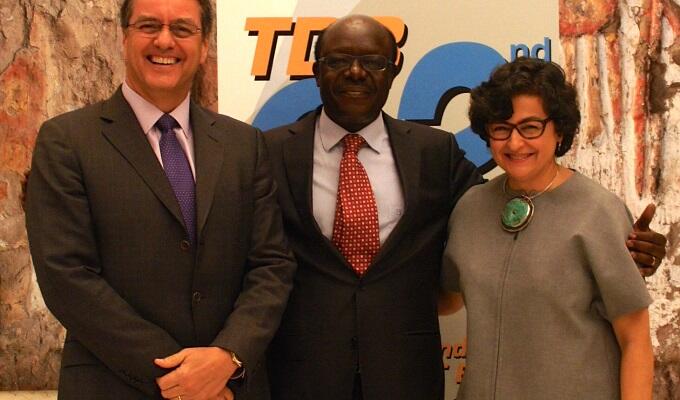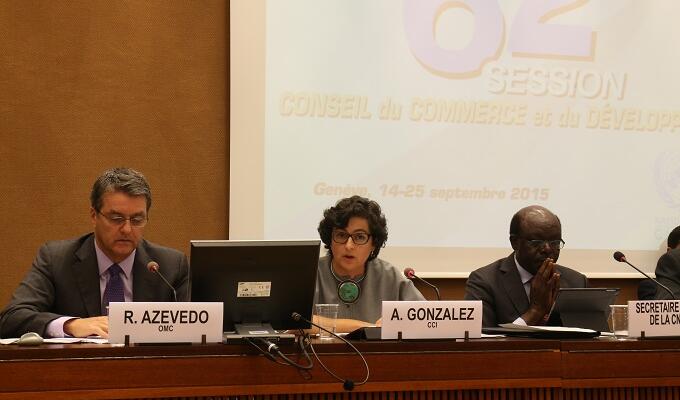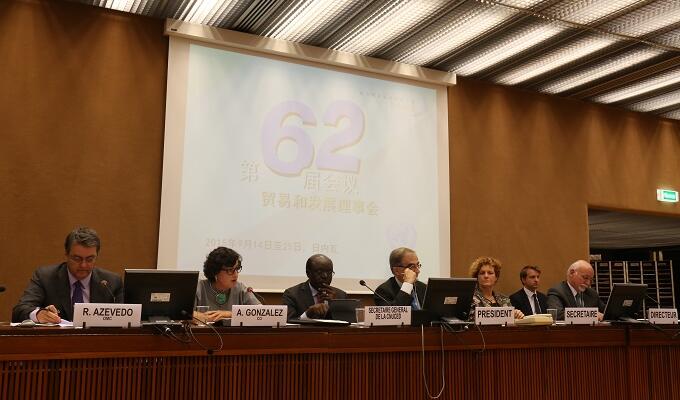


Evolution of the international trading system and its trends from a development perspective
Speech delivered by ITC Executive Director Arancha González at the UNCTAD 62nd Session of the Trade and Development Board
Geneva, 21 September 2015
Mr. Mukhisa Kituyi, Secretary General, UNCTAD
Mr. Roberto Azevedo, Director General, WTO
Ambassador Alberto P. D’Alotto, President of the TDB
Ladies and gentlemen
Only a few days from now, governments from around the world are set to adopt a new global agenda for sustainable development.
“Transformative” is a word we have heard increasingly this year. But the 2030 Agenda for Sustainable Development deserves the term. It has the ambition and the potential to transform our economies and societies. It could serve as a template for policies that will reduce our collective environmental footprint while extending opportunities, equality and dignity to the many who have been excluded from our rising prosperity.
Achieving its goals of gender equity and reduced inequality within and between countries would provide billions of women, youth, and marginalized communities the chance to make fuller use of their talents and become real economic actors.
Translating the promise of these new global goals into reality will demand determined policymaking – and implementation – at every level of government. But this is not just a hymn sheet for policy makers. It will require fundamental changes in the way the private sector does business, from investing and hiring, to how it procures goods and services. We as individual consumers will also have to make more responsible decisions. In many respects the post 2015 agenda is our compact to protect this world for future generations.
Financing the sustainability transformation will require substantial up-front investments. But these are small in comparison to the long-term costs if we continue business as usual.
The recent conference on Financing for Development in Addis Ababa underscored that development financing must now come in many forms. Traditional development assistance remains critical, especially for LDCs, SIDS, small, vulnerable economies, landlocked developing countries, and post-conflict and fragile states. Traditional donors must work to meet their aid targets, and where they can, to exceed them. And more economically robust developing countries also have a role to play in deepening South-South cooperation.
At the same time, all countries –developed and developing - will have to do more to mobilize domestic resources, by which I mean fairer, more equitable and effective taxation systems, together with action to combat illicit capital flight. I’d like to point here to UNCTAD’s thought leadership on investment and reducing the tax dodging associated with it. The third part of the means of implementation puzzle is the private sector.
Like the Millennium Development Goals have done for the past 15 years, the Sustainable Development Goals are likely to catalyze novel thinking and funding towards achieving the identified objectives. This is welcome. The new global goals will also spur important new work on how best to monitor and measure our progress. After all what we don't monitor we can't evaluate and what we don't measure we can’t regulate. This is essential to maximize the results from finite resources, and to enable course corrections when necessary.
But financing and good measurement alone aren’t enough. We need to build effective partnerships among Northern and Southern governments, civil society and business to leverage every cent of aid, tax revenue, and private investment for maximal development impact.
We also have to do a better job than we have in recent years of cooperating multilaterally. We cannot achieve our shared goals on food security, environmental conservation or economic stability and growth without effective international policy coordination.
One of the background documents for today’s meeting rightly pointed to the world’s “unprecedented trade integration.” Let me add that it’s not just about goods, services, and investment. Pollutants, diseases, and macroeconomic development now cross borders more or less instantly.
Just last week, we saw policymakers from Myanmar to Morocco hanging on every word of the US Federal Reserve. And we saw US central bankers keenly aware that delivering employment and price stability at home now requires them to think about how their interest rate decisions affect the rest of the world.
The Paris climate COP and the WTO ministerial in Nairobi are important not just for the agreements that we hope they will reach, but for the broader signals they will send about our willingness to work together to decarbonize our economies and to pursue more open and development focused trade.
Ladies and gentlemen: We will achieve the post-2015 agenda’s goals of poverty reduction, sustainability and inclusion together – or not at all.
Trade, as we know, is an important driver of growth and structural transformation. Active engagement in international trade for value-added goods and services has been a big part of the story for every country that has sustained high growth long enough to make a major difference in people’s living standards.
All of us in this room can agree that the countries that have shared the least in the human development gains of the past few decades are precisely those that have been marginalized in the global economy. This is why we welcome the 2030 Agenda for Sustainable Development recognition of trade as an “engine for development.” Where the Millennium Declaration mentioned “trade” twice, the 2030 Agenda for Sustainable Development mentions it sixteen times. And it is not just a numbers game. The change reflects a better understanding of how trade needs to interact with other areas of our economies and societies to generate transformative change. Let me mention a few examples:
Increased Aid for Trade and the Enhanced Integrated Framework are directly connected to the goal on “full and productive employment for all.”
The Agenda explicitly recognises the need to economically empower women as well as to better connect SMEs and small farmers to markets.
It calls for trade opening, farm and fishery subsidy reform, and a strengthened multilateral trading system anchored firmly within the WTO.
Additional goals, such as sustainable industrialization, have deep connections to trade. Virtually all successful economies in the past century have used foreign demand to help shift people and capital out of subsistence work into more productive activities.
But while the 2030 Agenda’s attention to trade is heartening, the recent headlines about trade have been less so. Trade growth – even South-South trade growth - has been slowing, as WTO statisticians and UNCTAD analysts have been telling us. Part of this is cyclical. Output growth looks fragile even in emerging markets. We know now that part of it is structural: research has shown that one reason for slowing trade growth is simply that value chains have matured. More developing countries can now source at home components they used to have to import.
Nevertheless, there are reasonable grounds to worry that slower trade growth will make it harder to reap the efficiency gains that come with increased specialization and scale. This only strengthens the case for supply-side interventions to better integrate into the global division of labour, the countries and regions that have thus far not been fully integrated into international value chains. Here I am speaking about Africa, but also Latin America and the Caribbean, South Asia and the Pacific as well as Central Asia.
This means making it easier for new and existing firms to increase their productivity and connect to value chains. It means helping boost value-addition in the agriculture sector, which still employs the majority of the world’s poorest people.
Connecting to international trade networks, however, is not an end in itself. What matters is generating more and better jobs – especially for the groups in society that need it most. And this is where small and medium-sized enterprises, or SMEs, come in.
SMEs account for the majority of job creation in virtually all countries – over 70% of jobs worldwide. When SMEs are able to access finance, build trade capacity and skills, become more competitive and connect to international markets - in a nutshell, when SMEs trade – they generate more and better jobs. These jobs help spread the gains from trade over larger segments of countries’ labour markets.
The findings from ITC’s forthcoming new annual flagship report, the “SME Competitiveness Outlook”, make a compelling case for SMEs as the missing link for inclusive growth. The inaugural edition, titled “Connect, Compete, and Change for Inclusive Growth,” will be launched here in Geneva on 14 October.
Without divulging too much about the report’s contents, I can tell you it reveals that the productivity gap between SMEs and their larger competitors is wider in developing countries than in developed ones. And that closing this gap would make for a more even income distribution, since lower-wage earners tend to work for smaller companies. The report points to how SMEs can ‘internationalise elegantly’, and avoid being trapped at the lower end of value chains. It examines different determinants of SME competitiveness, yielding lessons about the factors holding SMEs back in different locations.
I invite all of you to join us for the launch of the SME Competitiveness Outlook.
I now would like to turn to another critical force for making growth inclusive: women.
The case for women’s economic empowerment is not limited to the social dividends. In sectors as diverse as agriculture and engineering, a more diverse gender mix is correlated with greater productivity. And in a world where a close to 1 billion women could be contributing more robustly to their countries’ economies were they allowed to, or trained to, closing the gender gap would be equal to adding a new China or India to the global economy.
In more than 100 countries today women are barred from doing certain work solely because they are women. We simply cannot afford to maintain the legal, financial, and social policy barriers that keep women out of the workforce as entrepreneurs or employees.
Trade is an important vehicle for women’s economic empowerment – but only if women are able to connect to markets as entrepreneurs, employees, producers, and consumers. And while women own close to 40% of SMEs worldwide, ITC business surveys from twenty developing countries suggest that only about one-fifth of firms that engage in trade are led by women.
Increasing these numbers and facilitating these connections are core priorities for ITC. This is why, earlier this month, we organised a Women Vendors Exhibition and Forum in Sao Paulo, to connect women-owned businesses to suppliers. The B2B meetings there led to over $20 million in prospective deals.
We are working to help women-owned businesses gain a greater share of the multi-trillion dollar markets in corporate and public procurement. This summer, together with Google and the Brazilian tech firm CI&T, we asked techies around the world to develop a digital platform to help millions of women-owned businesses connect to potential buyers. A young woman from Kenya won the tech challenge, and is now working with us to launch the app by the WTO Ministerial in December.
Bringing one million women-owned businesses to markets by 2020 was behind a Call to Action we launched this month in Sao Paulo. This can only work if it is a collective endeavour.
At ITC, we are doing our part. We have pledged that 40% of our work, across the spectrum from market intelligence to facilitating market penetration, will benefit women. I encourage you to make your pledge and share it with others at the “Women in Business” event which the Kenyan Government and ITC will be hosting on 14 December on the eve of WTO MC10.
The WTO 10th Ministerial Conference is less than 100 days away. And I would like to reiterate ITC’s support for a positive outcome in Nairobi, especially for LDCs. We cannot have the WTO car stop just as it is leaving the New York garage.
ITC has no magic recipe to offer on what Members should do, either in Nairobi or in the future. ITC’s role is not to advise WTO Members. Members’ decisions are theirs alone to make. Our role is to provide objective analysis and transparency that can contribute to building trust and consensus.
It is to carry out technical work when requested to do so, as the small, vulnerable economies did recently.
It is to bring business perspectives to the table, in light of our unique role as a UN/WTO agency mandated to engage with the private sector. Our programmes and projects respond to what businesses tell us are the factors affecting their efforts to expand internationally today.
We will continue to work with over 40 developing countries and LDCs on implementing the Trade Facilitation Agreement, as we have done with Mauritius, Nicaragua and Niger who have already ratified the agreement, so that it can soon enter into force.
We will continue to support the accession of new Members to the WTO family, as we have done with Liberia and Afghanistan whom we hope to see soon join together with Kazakhstan and others to come such as Comoros, Ethiopia or Sudan.
We will continue to support SMEs harness the potential of e-commerce to become "micro multinationals"; to provide support on services trade – such as the report we just launched last week with UNWTO on trade and tourism - to help maximise the sector’s contribution to sustainable development; to shed light on voluntary standards in trade – with a new initiative with the UN Global Compact being launched next week to support more sustainable value chains and to help governments understand how businesses experience non-tariff measures.
ITC stands ready to help delegations and governments in any way we can to foster positive outcomes at MC10 and at UNCTAD XIV.
Thank you for your attention.



